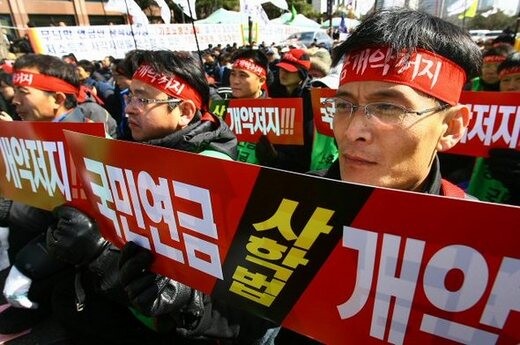hankyoreh
Links to other country sites 다른 나라 사이트 링크
Gov't, civic groups divided over possible end to labor rights watch in S.K.

South Korean government and labor organizations have been feuding over an impending decision by the Organization for Economic Co-operation and Development (OECD), which is set to decide in June whether to end its 10-year inspection on basic labor rights in South Korea. The government wants the OECD to end the inspection, while labor groups hope it continues its monitoring.
The South Korean government told the OECD that it will meet its standards regulating labor rights when it joined the organization in December 1996. But as the government pushed ahead with further restrictive labor laws in January 1997 - despite the trade unions' protest that this would deteriorate the labor rights - the OECD made a decision to monitor Korea to see whether it was following through with its promise. According to this decision, South Korea has been under watch regarding the status of its workers' labor rights by the OECD's Employment, Labor and Social Affairs Committee (ELSAC).
On April 11, the Ministry of Labor said it had recently sent a 34-page report to the OECD, asking the international body to end the inspection ahead of a two-day conference, the 110th Meeting of ELSAC. The conference, which will start on April 23, is expected to discuss the status of progress in South Korea related to labor law. The ministry's report concluded South Korea's labor-related laws meet international standards.
In the report, the government said, "Progress has been made in labor rights in the 10 years that Korea has been a member of the OECD, including the legalization of the Korean Confederation of Trade Unions and granting the right to organize to teachers and public servants." The government urged the OECD to end its monitoring, saying two remaining issues - that of the legality of multiple labor unions at a single company and the ban of companies from paying their union's officials - could be achievable by 2009. In addition, the government said, if the OECD continues to carry out its monitoring, it would send the wrong message to labor groups, who have refused to talk to management or the government, the report said.
On the same day, the Korean Confederation of Trade Unions (KCTU) held a press conference with domestic and foreign journalists, calling for the OECD to continue its monitoring.
"If the OECD ends the monitoring without resolving major issues such as multiple labor unions and basic labor rights for public servants, it would present an illusion that the matter of basic labor rights is resolved," the KCTU said in a press release.
While the OECD advises South Korea to allow workers at one company to form multiple labor unions, the government decided through a law revision in last year to ban such a union system until 2010, the KCTU said. In the case of basic labor rights for public servants, higher officials are banned from joining a union and members of the public servants' union are banned from going on strike, it said. In addition, 188 union officials were arrested last year and 114 were arrested in 2005, defying the OECD's advisory that labor-related activities should not be punishable under criminal law, the KCTU said.
Woo Mun-suk, a spokesperson at the KCTU, said, "Despite the international body's monitoring, there has been no change in the government's response. It continues to forcibly close union offices, arrest activists, and seek financial damages against union officials."
Please direct questions or comments to [englishhani@hani.co.kr]
Editorial・opinion
![[Column] Has Korea, too, crossed the Rubicon on China? [Column] Has Korea, too, crossed the Rubicon on China?](https://flexible.img.hani.co.kr/flexible/normal/500/300/imgdb/original/2024/0419/9317135153409185.jpg) [Column] Has Korea, too, crossed the Rubicon on China?
[Column] Has Korea, too, crossed the Rubicon on China?![[Correspondent’s column] In Japan’s alliance with US, echoes of its past alliances with UK [Correspondent’s column] In Japan’s alliance with US, echoes of its past alliances with UK](https://flexible.img.hani.co.kr/flexible/normal/500/300/imgdb/original/2024/0419/2317135166563519.jpg) [Correspondent’s column] In Japan’s alliance with US, echoes of its past alliances with UK
[Correspondent’s column] In Japan’s alliance with US, echoes of its past alliances with UK- [Editorial] Does Yoon think the Korean public is wrong?
- [Editorial] As it bolsters its alliance with US, Japan must be accountable for past
- [Guest essay] Amending the Constitution is Yoon’s key to leaving office in public’s good graces
- [Editorial] 10 years on, lessons of Sewol tragedy must never be forgotten
- [Column] A death blow to Korea’s prosecutor politics
- [Correspondent’s column] The US and the end of Japanese pacifism
- [Guest essay] How Korea turned its trainee doctors into monsters
- [Guest essay] As someone who helped forge Seoul-Moscow ties, their status today troubles me
Most viewed articles
- 1[Column] The clock is ticking for Korea’s first lady
- 2After 2 months of delayed, denied medical care, Koreans worry worst may be yet to come
- 3Hong Se-hwa, voice for tolerance whose memoir of exile touched a chord, dies at 76
- 4[Column] Has Korea, too, crossed the Rubicon on China?
- 5[Correspondent’s column] In Japan’s alliance with US, echoes of its past alliances with UK
- 6Samsung barricades office as unionized workers strike for better conditions
- 7All eyes on Xiaomi after it pulls off EV that Apple couldn’t
- 8[Editorial] As it bolsters its alliance with US, Japan must be accountable for past
- 9[News analysis] After elections, prosecutorial reform will likely make legislative agenda
- 10US overtakes China as Korea’s top export market, prompting trade sanction jitters